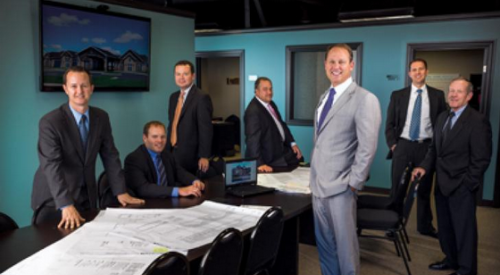| Engle Homes/Arizona president Mark Upton (left) places talented employees in close relationships with every buyer. Shown with Upton are (left to right) sales/marketing process manager Karen Murray, north region manager Tom McAndrew and south region manager Dennis Palmer. |
With only 75 employees (including a full sales force) handling over 500 closings a year, Mark Upton's Engle division in Phoenix seems like the direct opposite of Martin Ginsburg's company in New York. In staffing level, certainly, they part company. But in slavish dedication to customer satisfaction measurement and quality process control, as well as maintaining constant communication with customers, the two top dogs in this year's NHS competition are really very similar.
With a score of 176.71, Engle Arizona wins the NHS award for builders closing over 500 homes a year, a category we believe deserves special recognition because of the difficulty of nurturing personal relationships with customers in such high-production building firms.
"I don't think customer satisfaction has anything to do with size," Upton says. "Buyers don't care whether your company is large or small. They want location, design, quality materials and workmanship, value and personal service, and the same things that drive customer satisfaction at the small builder level are available to big builders. The trouble is, the more you get into a production-driven mode, the easier it is for employees to think success is measured by the number of closings rather than the satisfaction level of individual buyers. We won't fall into that trap. If you measure customer satisfaction carefully and make that the focus of your organization, you can achieve both high volume and high satisfaction."
|
||||||||||||||||||||||
Sales Relationship Is Critical
One reason Upton can staff at a lower level than Ginsburg is that he farms out land development, but has his own sales force. And each salesperson remains the primary personal contact for customers right through construction and into warranty. Sales agents become the same kind of advocate as Ginsburg's personal home counselors after the sale.
"The key to our success is that we never let go of customers," says Engle sales agent Craig Tucker. "It's a relationship that's intense for at least six months. We have a (computerized) production status report that we use to keep track of construction progress, and we call customers every two weeks to give them a progress report -- if they don't call us first."
Tucker reports he has 46 home buyers in escrow right now and admits holding their hands through construction is a time-consuming part of his job. "With that and follow-up calls to prospects, I spend a good part of my time on the phone. But follow-up calls to current customers in escrow are one of my best sources of new prospects," he says.
"I'm working right now with the son of a couple who recently bought one of our golf course homes," Tucker says. "He's keeping track of construction for his parents because they live out of town. He likes the way we're treating them; now he want to buy. The sister of another buyer is coming in from California to talk to us next week. Word of mouth from happy customers is the best advertising there is."
Engle Arizona sales agents also counsel buyers through the selections process. "We have a design studio that our vendors staff that helps buyers make decisions on pools, landscaping, flooring, light fixtures, home networking, structured wiring and home entertainment," sales and marketing process manager Karen Murray says. "Buyers must spend a whole day or two half-days there within a few days of signing their sales contract. We only give them 14 days to finalize all their selections. Then they're done. They can sit back and watch the house go up."
Engle has plenty of do's and don'ts for buyers, but no surprises. "Setting expectations is an important part of meeting them," Upton says. "We design every process for every contingency we can foresee, then we train our people and our customers on exactly what's going to happen, when and how, from contract to closing and into the warranty service period. We confidently sell buyers on what the process is going to be like, then we deliver on that promise."
Engle's production process runs with the efficiency of a German railroad -- on time, with every component part placed together in the same way every time. "Construction slots are assigned according to our even-flow production system, which is based on the sales pace in each community," south region manager Dennis Palmer says. "Salespeople are given delivery slots every week based on the demand in the community. We measure through the construction process to make sure we are not jamming trades anywhere along the line. If sales slow down, we cut back on the flow."
However, Engle does not promise buyers a closing date at contract. "We tell them up front that they will not have a locked-in closing date until 30 days before the close of escrow," Palmer says.
Like Ginsburg, Engle is fanatical about measurement, especially customer satisfaction at various points during the buying experience. Internal satisfaction surveys are conducted at the time of contract and closing. NRS conducts formal surveys of Engle customers after the pre-start orientation, which is conducted jointly by the sales agent and builder (super), after a pre-drywall orientation where the sales agent and builder walk the home with the buyer, and during the warranty period at 30 and 120 days after closing. Consultant Barbara Nagle also conducts 25-call spots checks on customer satisfaction each quarter for Engle. And finally, the firm subscribes to the J.D. Power annual survey of many builders' customers across the Phoenix market.
Again like Ginsburg, Upton is also fanatical about not closing houses with outstanding punch-list items. Builders do a pre-closing orientation with buyers three days before closing. Any items that need attention are the subject of a meeting the day of closing. "The builder has to get the buyers' sign-off that the items have been corrected to their satisfaction and fax the form in before he can proceed with the closing," Upton says. "If any items are still outstanding, he has to call me personally to explain why. I'm the only person who can authorize a closing with even a single item outstanding. In a few cases, there's a back-ordered cabinet door or something of that nature.
"Anything that will disrupt the customers' lives to correct, we won't close. I'd rather have them mad at me for a couple of days than mad at me for life," Upton says. "But that hasn't happened in two years, and we're now running 95% of closings without even a single small item."
Unlike Ginsburg, Upton is adamantly against staffing a separate warranty service department. The builders handle all warranty work. "We don't like hand-offs from one person to another," Upton says. "The sales agent and the builder have personal relationships with our buyers all through construction. We want the builder to handle warranty. What that does is motivate our people, including the trade crews, to get the work right the first time. None of them wants to be running out to fix a succession of small items, but they also know they are measured on both the quality of their work and the satisfaction of their customers.
"We tell our people to do the right thing for buyers," Upton emphasizes. "You will never get sideways with our organization for doing that. We almost have to go to overkill to get the message across that our relationship with buyers is critical and no one is going to get in trouble for spending money on customer service."
Upton sees a tendency in the production building industry for employees to fear spending money to make buyers happy. He blames it on the long punch-lists that many builders ignore at closing. "People get those ideas from working in companies where houses are being closed that are only 97% complete. The dollars go up in customer service because they're building the last 3% of the house during the warranty phase. No wonder people don't want to add to that total."
Talented people are the most crucial element Engle and Ginsburg have in common. Both firms are way above the norm in the caring, empathetic people they place in critical customer relationship roles. Upton admits he has to look hard to find the right people skills for both sales and builder roles.
"Our sales people are different," he says. "They know they'll be measured on customer satisfaction throughout the home buying experience, but they still have to be able to sell, to provide clear documentation, and to train and defend our processes with buyers."
Construction people are just as critical, and the change doesn't stop with builders. "We used to hide rough, tough supers from buyers in this industry, but now the standard has become more polished, professional builders who can take a lead role in customer relations. The next step is to take that same level of professionalism into the trade crews. We are now training the crew leaders who work on our jobs to understand this approach.
"We're now getting survey feedback on our trade crews and how professional they are. Our even-flow production and open lines of communication make us the preferred employer for the trade crews as well as the contractors. It works the same way for customers. Confidence in an organization is read in a heartbeat by everyone. When they see a confident organization with open lines of communication in all directions, people develop a sense of ownership for their part of the process."












